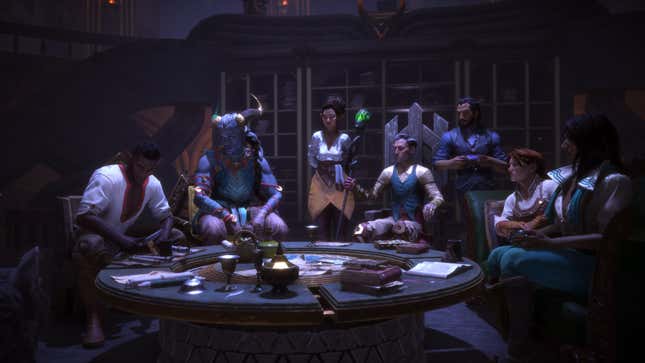
Screenshot: BioWare / Kotaku
Dragon Age: The Veilguard’s party is probably the best BioWare has introduced in the series since it began in 2009. It’s the smallest group, with only seven members filling the titular team, but each of them acts as a window into the rich world of Thedas. They build compelling friendships with the rest of their allies, and feel ripe for years of fandom adoration.
Based on all the conversations I’ve had about The Veilguard, I would not be surprised if your own list ranking these seven party members looks nothing like the one you’re about to read. But who is the best character accompanying Rook as they fight the elven gods? Who is the most memorable bro or beau you can talk to in between missions in the Fade? Can you possibly rank your friends like a MySpace Top 8 when they’re all some of BioWare’s most memorable characters? We’re gonna try.

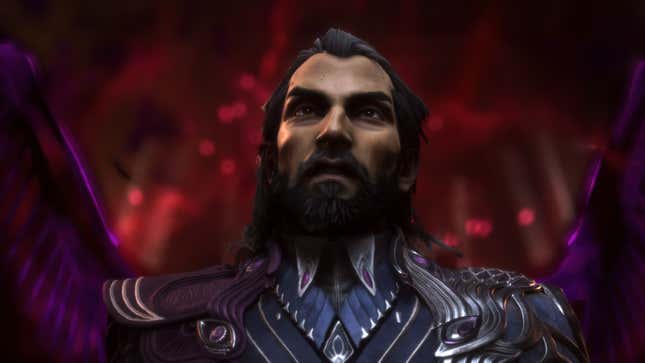
Screenshot: BioWare / Kotaku
Admittedly, your mileage on Lucanis and Neve may hinge on which city you choose to save in The Veilguard’s first act, as not helping their respective homes will narrow the possibilities of their arcs. To be clear, I’ve seen both variations before writing this ranking, and still would probably put him at the bottom of this list. Lucanis is a web of fascinating contradictions. On the surface, he seems like a character ripe for tiresome edgy nonsense with his brooding demeanor, magic crow wings that he uses to fly around and strike his targets from above, and the fact that the demon embodiment of Spite lives within him. But he’s also kind of a golden retriever.
Lucanis drinks more coffee than any writer you’ve met, just to stay awake and maintain control of his body, cooks for the team and remembers all their favorite foods, and he is protective of those he cares about. His story is a Game of Thrones-esque political drama with family ties and blood magic in the mix, and unfortunately, it can feel a bit truncated on certain playthroughs. Still, Lucanis’ inner struggle with his literal and figurative demons shines through.
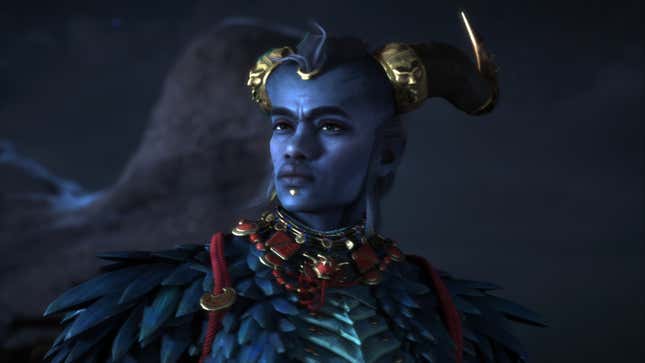
Screenshot: BioWare / Kotaku
The lone qunari on the team is an interesting one. Taash joins The Veilguard initially to help the team fight the dragons they’ll face when fighting the elven gods. Though their foes are the size of buildings, their biggest fight is the one they deal with internally as they navigate the intersection of gender and culture. Taash is standing between two worlds: the Qunari one they were born in, and the Rivain one they have grown into. They feel pulled in different directions, whether that be in the way they dress, the food they eat, or the gender they identify as.
Though Taash can initially come off as bullheaded and deadpan, it’s clear they are an introspective, thoughtful person who wants to be themself, but also seeks the approval of those who have cared for them. Finding yourself when you have so many forces telling you who you’re supposed to be is a pretty universal concept, but watching The Veilguard wrestle with these ideas within its own world remains one of the series’ strengths, and Taash is one of the most endearing and entertaining examples under its belt.
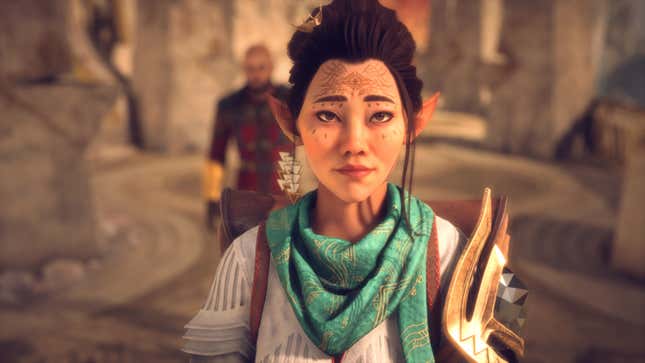
Screenshot: BioWare / Kotaku
At first, Bellara felt primed to slip through the cracks for me. The elven mage, introduced as an expert on ancient elf technology and magic, seems scatterbrained if she’s not fixated on one of her interests. But as her story unfolds, it becomes clear that Bellara’s preoccupation with elven artifacts, lost history, and hobbies like fiction writing are all born out of a need to distract herself from her grief, and possibly make up for her failures.
When you meet her, Bellara has been hunting for a way to make the world make sense again, only for the elven gods she had known her whole life to return, and everything she knew is repeatedly flipped on its head. What does someone who seeks to restore history do when it’s constantly changing? What decisions do you make when the answers you’ve found can hurt those who have already gone through so much? Bellara is the kind of character a story like The Veilguard needs: as the world changes, she’s the most well-equipped to understand its significance and ponder the effects it will have on everyone when the dust settles.
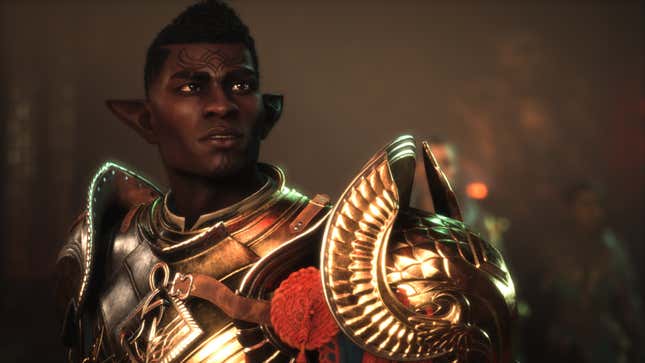
Screenshot: BioWare / Kotaku
The Veilguard’s Grey Warden companion is a man-and-a-half. Davrin is a monster hunter who carves each of the beasts he faces into wooden statues from logs he cuts himself. He’s also a great bird-cat father to Assan, one of the last griffons who was once thought extinct in the Dragon Age universe. How could I not fall for the lumberjack bird-cat dad who is doomed by the narrative because he’s part of a faction that will one day go underground to die when they start to go mad from the darkspawn taint inside him?
But I digress. Davrin is one of the best examples The Veilguard has of a character whose very personal story has long standing ramifications for the world of Dragon Age. As a Warden, Davrin knows his time is relatively limited, and feels a great deal of responsibility to protect those around him. He wants to ensure that he leaves the world better than he found it. The revelations he finds in his quest fundamentally shift how the Wardens will be viewed in the annals of history, but he doesn’t lose sight of the good those still living under the banner can do. All of this is delivered with a heartfelt story of a man and his bird-cat son learning to love and live with each other. Davrin’s story has some of the greatest range in The Veilguard, and it’s all elevated by the dashing man in the center (I’m sorry, I’m gonna thirst for my video game boyfriends).
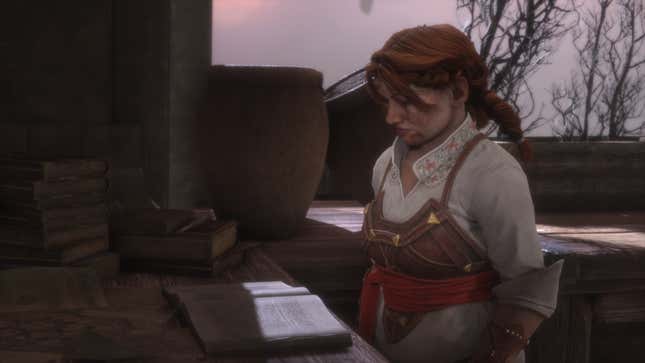
Screenshot: BioWare / Kotaku
Lace Harding could have easily been a throwaway party member in The Veilguard. The dwarven rogue started as a supporting character in 2014’s Dragon Age: Inquisition, and that’s a long time for fans to project an idealized vision of the mostly jovial scout in their minds. But Harding is so much more complex in The Veilguard, and a lot of it has to do with its willingness to examine the cracks in the happy-go-lucky attitude she’s been known for.
Harding becomes a centerpiece for some of the biggest reveals in dwarven lore Dragon Age has ever dropped, and as she uncovers truths about her people, her anger for what the dwarves have lost becomes central to her world. Things are changing for everyone in The Veilguard, and it often feels like Harding has no one to relate to as she carries heavy dwarven baggage on her back. Rage for what she and her people have lost doesn’t have to consume her, as justified as it might be. But one way or another, someone who once played the support role for the Inquisition becomes a pillar for the dwarven people to build upon. It’s inspiring to see.
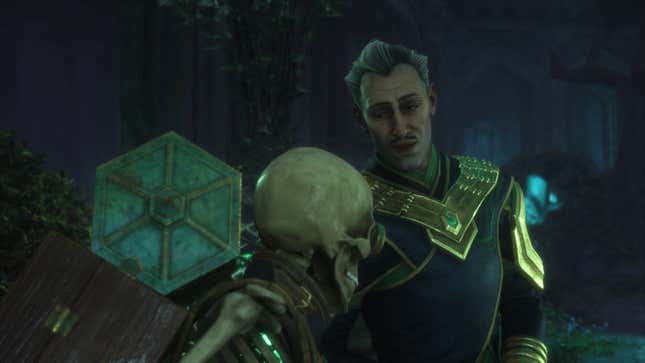
Screenshot: BioWare / Kotaku
Every friend group needs a silly guy. Emmrich, a necromancer with a skeleton assistant named Manfred, fills that role. Though raising the dead sounds like dirty, scary work (and not everyone on the team is thrilled by the notion), this mage is an eccentric, kind hearted, and often goofy old man who is a joy to be around. Though death and grief are universal concepts that could be part of any universe, Emmrich spends much of his time studying and celebrating death as a cultural concept within Thedas.
Some of the most memorable scenes in The Veilguard are the quiet moments when he regales you with stories about his fascination with death, how we face it, and how he maintains respect for those who are gone as he brings them back. But what does a person who deals in life and death feel about his own oncoming end? What do they think when the death in question is no longer something abstract and related to people they’ve never known? Emmrich explores those ideas in his work, but once The Veilguard makes him confront his relationship with death, he is catapulted to one of the most memorable mages we’ve ever met in Thedas.
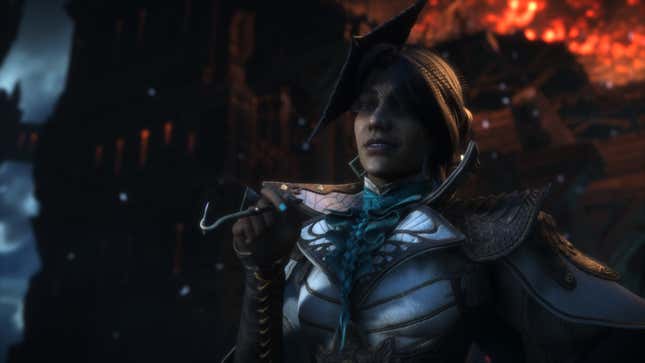
Screenshot: BioWare / Kotaku
Like Lucanis, your opinion on Neve might vary depending on whether you help her save her home of Minrathous in the early hours of The Veilguard. But in both routes, there’s something compelling about watching the mage detective in her element. Neve knows the name of a lot of the people you meet on the streets of Minrathous. Even as the elven gods are blighting cities and some of the biggest revelations of the Dragon Age universe are raining down upon Rook and their team, Neve doesn’t lose sight of the people on the ground who will still be struggling if and when the Veilguard accomplishes their mission to stop the gods. The question is whether she wants to fight for them from the shadows, or become a beacon of hope to pave a new path in the city.
Neve is perhaps the most concise example of The Veilguard’s broader thesis. Where often the series shaves down conflict and progress into factions and choices nudged by the player, The Veilguard feels like the series finally believes in something, rather than just showing you a nuanced ideological battle and letting you choose which one deserves to be wiped from the face of Thedas.
Neve believes that the world can be better, and is willing to do whatever it takes to find that path forward. Oppression and the structures that allow it are not choices or debates in her mind; she is here to fight for the people of Minrathous, it’s just a matter of how. This world is changing, and there are people who will be written in the history books as those who charted the course. Neve may choose to omit herself from the official stories if she can, but she won’t sit idly by while those who benefit from the way things have always been try to direct how things will be.

 2 months ago
92
2 months ago
92
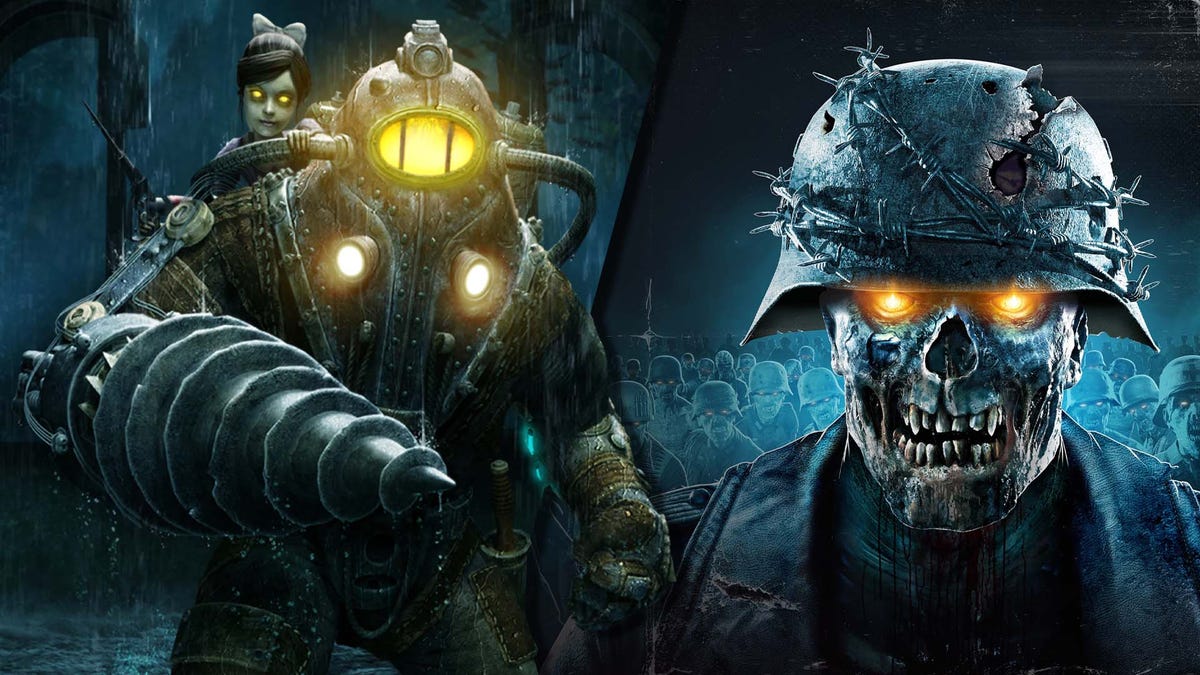


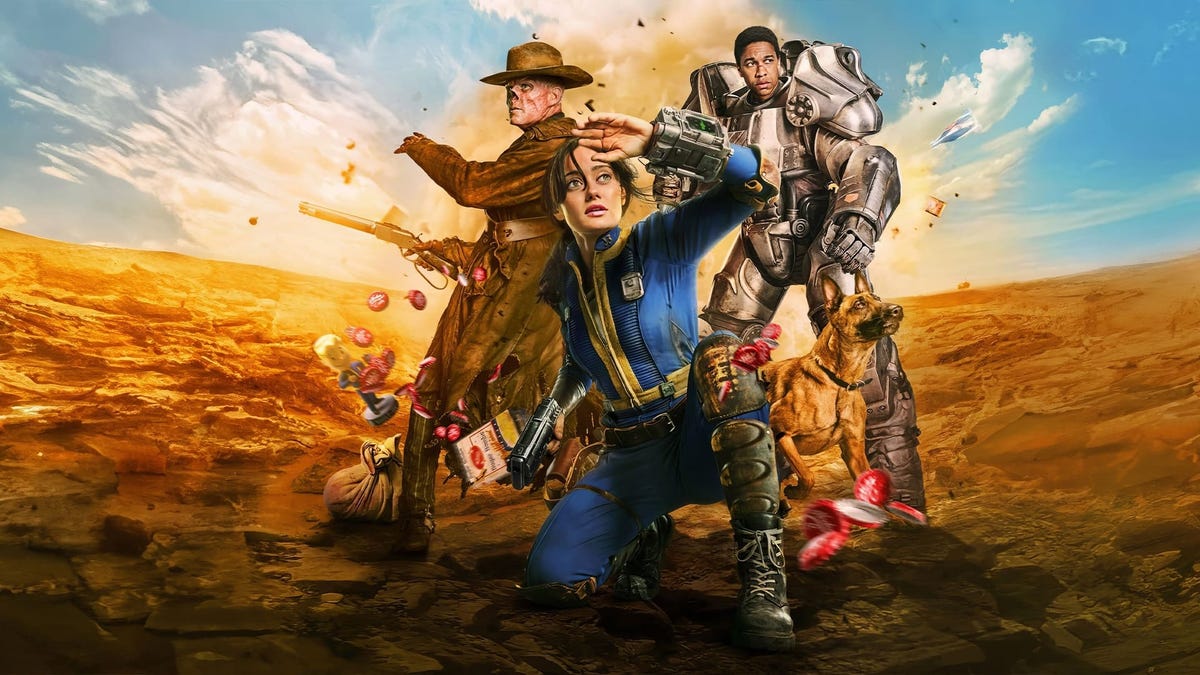



![Anime Reborn Units Tier List [RELEASE] (November 2024)](https://www.destructoid.com/wp-content/uploads/2024/11/anime-reborn-units-tier-list.jpg)
